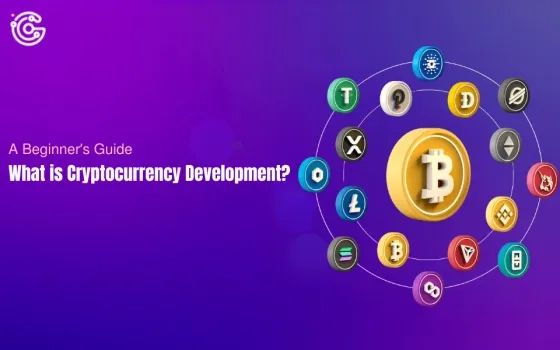Cryptocurrency has emerged as one of the most revolutionary financial innovations in the 21st century. It has transformed the manner in which people think of money, transactions, and digital possession. Unlike fiat currencies that are managed by governments and financial institutions, cryptocurrencies exist in a decentralized platform with greater transparency, security, and autonomy for users. The digital currency idea got popular with the launch of Bitcoin in 2009, opening up the opportunity for a widening pool of cryptocurrencies, blockchain implementations, and DeFi solutions.
As the usage of digital assets grows, enterprises and developers look towards cryptocurrency development to develop fresh coins, tokens, and blockchain solutions. What does cryptocurrency development really mean, though? Whether you are a future blockchain developer, a startup wishing to create your own digital currency, or simply interested in learning how cryptocurrencies operate, learning the basics of cryptocurrency development is important. This beginner's guide will assist you in learning the main points of cryptocurrency development, such as blockchain technology, smart contracts, security features, and the development process.
Understanding Cryptocurrency Development
Cryptocurrency is a type of digital or virtual currency that utilizes cryptographic methods to secure the transaction and manage the creation of new units. Unlike fiat currency, cryptocurrencies function on a decentralized network, often in the form of blockchain technology. The decentralized environment reduces the presence of intermediaries like banks, and transactions are thus faster, more secure, and more transparent.
The growth of cryptocurrency has been phenomenal. Bitcoin, launched in 2009 by pseudonymous Satoshi Nakamoto, was the first widely accepted digital currency. Since then, thousands of cryptocurrencies have been created, each with distinct features. Entering 2025, the future of digital assets is bright, with developments in decentralized finance (DeFi), non-fungible tokens (NFTs), and smart contract platforms leading the way.
Key Aspects of Cryptocurrency Development
1. Blockchain Technology
Cryptocurrency development is based on blockchain technology, which is a distributed ledger that logs all the transactions. The ledger is kept on various nodes, making it secure and transparent. It's very important to select the right blockchain for your project, be it Bitcoin, Ethereum, Binance Smart Chain, or a custom build solution.
2. Consensus Mechanisms
Cryptocurrencies utilize consensus mechanisms for validating transactions and securing the network. Some widely used mechanisms are:
- Proof of Work (PoW): Adopted by Bitcoin, this method involves miners solving complicated math problems in order to verify transactions.
- Proof of Stake (PoS): An energy-efficient version where validators are selected depending on the coins they own and stake.
- Delegated Proof of Stake (DPoS): An evolution of PoS where users delegate their stake and vote for delegates that confirm transactions for them.
3. Cryptocurrency Token Development
Developing a cryptocurrency is to design and implement a digital asset with an identified purpose. There are two primary types of digital assets:
- Coins: These have their own blockchain, e.g., Bitcoin and Ethereum.
- Tokens: Tokens are developed on top of established blockchain networks and can be used to represent assets, utility, or governance. Ethereum's ERC-20 and Binance Smart Chain BEP-20 token standards are among the most common.
How to Develop a Cryptocurrency
Developing a cryptocurrency involves several steps:
1. Defining the Purpose
One must define its purpose before beginning a crypto development project. You are building a decentralized application (DApp), a DeFi platform, or a new payments system? Defining the issue your cryptocurrency solves is crucial for its success.
2. Choosing the Right Blockchain
Choosing a blockchain platform is based on security, scalability, and cost. Although Ethereum is widely used for smart contract applications, newer platforms such as Solana and Polkadot provide better speed and efficiency.
3. Creating the Smart Contract
Smart contracts are self-executing contracts programmed on the blockchain. They execute transactions without the need for intermediaries, providing trust and transparency. Solidity, Rust, and Vyper are some of the programming languages that are used to write smart contracts.
4. Developing the Cryptocurrency Wallet
A wallet for storing and handling digital assets is required. Wallets are either hot (online) or cold (offline) and should be developed with strong security features.
5. Integrating Security Features
Security is a top priority in cryptocurrency development. Two-factor authentication (2FA), encryption, and multi-signature transactions are some of the features that ensure users are secure from cyber attacks.
6. Testing and Deployment
Prior to the release of a cryptocurrency, it is essential to test it thoroughly to detect vulnerabilities. Testnets enable developers to test without impacting actual assets. After testing, the cryptocurrency is released on the mainnet.
Costs Involved in Cryptocurrency Development
The cost of cryptocurrency development depends on considerations such as the choice of blockchain, security features, and tokenomics. An simple token can range from $5,000 to $30,000, while a custom blockchain with enhanced features can be from $50,000 to more than $500,000. Marketing, legal compliance, and maintenance costs are additional.
Cryptocurrency Development Services and Their Importance
As blockchain technology becomes more complex, most companies look for expert cryptocurrency development services. End-to-end solutions are provided by these services, such as drafting whitepapers, developing smart contracts, wallet integration, and listing on exchanges. With the collaboration of expert developers, there is a successful launch with long-term sustainability.
Challenges in Cryptocurrency Development
Though promising, cryptocurrency development has a number of challenges:
- Regulatory Uncertainty: Governments around the globe are yet to create legislation for digital assets, providing a volatile landscape for investors and developers.
- Security Issues: Smart contract vulnerabilities, hacks, and scams can result in financial loss.
- Scalability Problems: With growing volumes of transactions, blockchain networks can become congested, hindering processing speeds.
- Adoption Barriers: There are still many individuals who lack awareness and comprehension of how cryptocurrencies function, restraining their mainstream adoption.
Future Trends in Cryptocurrency Development
As we step into 2025, some trends are defining the digital asset future:
- Growing Adoption of Central Bank Digital Currencies (CBDCs): Governments are considering blockchain-based digital currencies for the transformation of financial systems.
- Layer-2 Scaling Solutions: Solutions such as the Lightning Network and Optimistic Rollups make transactions faster and cheaper.
- Interoperability: Protocols like Polkadot and Cosmos make communication between multiple blockchains effortless.
- Improved Security Protocols: AI-powered fraud detection mechanisms and more advanced cryptographic algorithms will enhance security.
- Tokenization of Real-World Assets: Physical assets such as real estate and commodities are tokenized to facilitate fractional ownership and trading.
- Sustainable Cryptocurrencies: Green blockchain technology is picking up steam, with minimized energy use and carbon footprints.
- AI and Blockchain Integration: Blockchain is being integrated with artificial intelligence to maximize automation, security, and efficiency.
Conclusion
Cryptocurrency creation is an interesting and rapidly evolving field. As a startup planning to introduce a new token or as a company seeking to use blockchain options, understanding the basics is necessary. If you approach this with the appropriate strategy, technology, and professional support, you can easily overcome the digital money revolution. In 2025 on the horizon, being aware of the newest trends will keep you ahead in this fast-paced environment.
From new token creation to decentralized applications, the scope in crypto development is immense. Complicated as it may be, the rewards of being part of the digital finance revolution are well worth it. If you are a developer, investor, or enthusiast, adopting blockchain technology and its developments will make you a leader in the world of cryptocurrency.

















